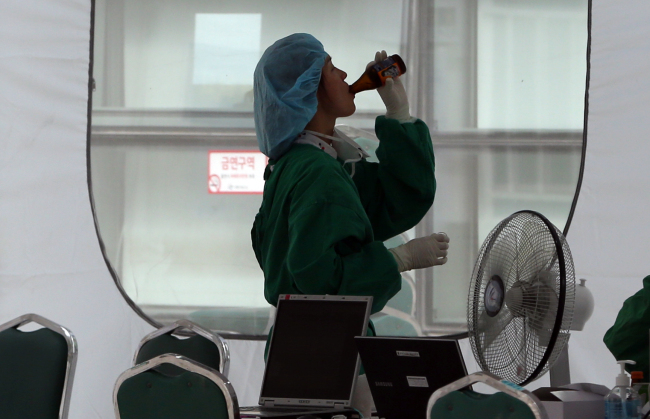South Korea reported no additional Middle East respiratory syndrome cases for two consecutive days, while announcing it would give out 16 billion won ($14 million) to support MERS-affected hospitals and expand the coverage of the national health insurance for patients with infectious diseases.
As of Monday afternoon, the virus has killed 32 and infected 182. Two more patients have been discharged from hospitals, raising the number of recovered patients to 93. This means more than half of all infected individuals have regained their health so far in Korea. No additional deaths were reported Monday.
The nation’s index MERS patient, who was officially diagnosed on May 20 after visiting three different hospitals prior to his diagnosis at the Samsung Medical Center in southern Seoul, was also released from the quarantine facility Monday. It is believed that he spread the virus to some 30 others.
The 68-year-old is currently being treated at a general medical facility.
As of Monday afternoon, the virus has killed 32 and infected 182. Two more patients have been discharged from hospitals, raising the number of recovered patients to 93. This means more than half of all infected individuals have regained their health so far in Korea. No additional deaths were reported Monday.
The nation’s index MERS patient, who was officially diagnosed on May 20 after visiting three different hospitals prior to his diagnosis at the Samsung Medical Center in southern Seoul, was also released from the quarantine facility Monday. It is believed that he spread the virus to some 30 others.
The 68-year-old is currently being treated at a general medical facility.

While the outbreak is once again showing signs of losing steam -- only three cases have been reported from June 24 through Monday, while 13 cases had been confirmed from June 20-23 -- the government announced a set of new preventive measures to deal with infectious diseases in the future.
The Health Ministry is to expand the coverage of national health insurance for patients with infectious diseases, as well as those who are required to be isolated with negative room pressure in hospitals. The cost of installing the negative room pressure system will also be covered by the state-run health insurance, said Kwon Deok-cheol, a senior official at the Health Ministry’s MERS response headquarters.
Negative air pressure rooms require a quarantine technique that prevents cross-contamination from room to room in medical facilities. It requires using a special ventilation system that produces negative pressure to make sure air flows into the isolation room but does not escape from the room.
The system is normally used to quarantine patients with airborne contagious diseases including tuberculosis, and has been used to isolate confirmed MERS patients in Korea since last month.
“It costs a lot to install negative air pressure rooms, and it also costs a lot to maintain them in good condition,” said Kwon.
“Through this MERS outbreak we’ve realized that there is a severe shortage of negative pressure rooms nationwide and many of the already-existing ones haven’t been maintained properly. Starting very soon, the cost of installing and maintaining the system will be covered by the health insurance.”
Kwon also said that all hospitals soon will be required to separate their emergency care units and special properties for patients who need to be isolated. All medical facilities will also be regularly evaluated on their safety practices on patients with contagious diseases. Hospitals will earn incentives or penalties according to their evaluation results, Kwon said.
“All of the new preventive measures are to be finalized and confirmed in July,” said Jeong Eun-kyung from the Centers for Disease Control and Prevention at the Health Ministry.
“We plan to support MERS-affected hospitals that have been shut down first. We may allocate more budget to help more hospitals in the future.”
Some 90 medical facilities nationwide, including the Samsung Medical Center, have been affected by the outbreak. Some hospitals are still being monitored as potential MERS patients remain in their incubation period. More cases may be identified from these facilities, authorities said.
The incubation period for those who were exposed to the virus at Hallym University Medical Center in Seoul ends on July 6. The Kyung Hee University Hospital at Gangdong, where about 90 patients with kidney diseases are currently being treated in isolation, will be monitored until July 10.
By Claire Lee (dyc@heraldcorp.com)


![[AtoZ into Korean mind] Humor in Korea: Navigating the line between what's funny and not](http://res.heraldm.com/phpwas/restmb_idxmake.php?idx=644&simg=/content/image/2024/04/22/20240422050642_0.jpg&u=)
![[Exclusive] Korean military set to ban iPhones over 'security' concerns](http://res.heraldm.com/phpwas/restmb_idxmake.php?idx=644&simg=/content/image/2024/04/23/20240423050599_0.jpg&u=20240423183955)


![[Graphic News] 77% of young Koreans still financially dependent](http://res.heraldm.com/phpwas/restmb_idxmake.php?idx=644&simg=/content/image/2024/04/22/20240422050762_0.gif&u=)
![[Herald Interview] Why Toss invited hackers to penetrate its system](http://res.heraldm.com/phpwas/restmb_idxmake.php?idx=644&simg=/content/image/2024/04/22/20240422050569_0.jpg&u=20240422150649)






![[Exclusive] Korean military to ban iPhones over security issues](http://res.heraldm.com/phpwas/restmb_idxmake.php?idx=652&simg=/content/image/2024/04/23/20240423050599_0.jpg&u=20240423183955)



![[Today’s K-pop] Ateez confirms US tour details](http://res.heraldm.com/phpwas/restmb_idxmake.php?idx=642&simg=/content/image/2024/04/23/20240423050700_0.jpg&u=)